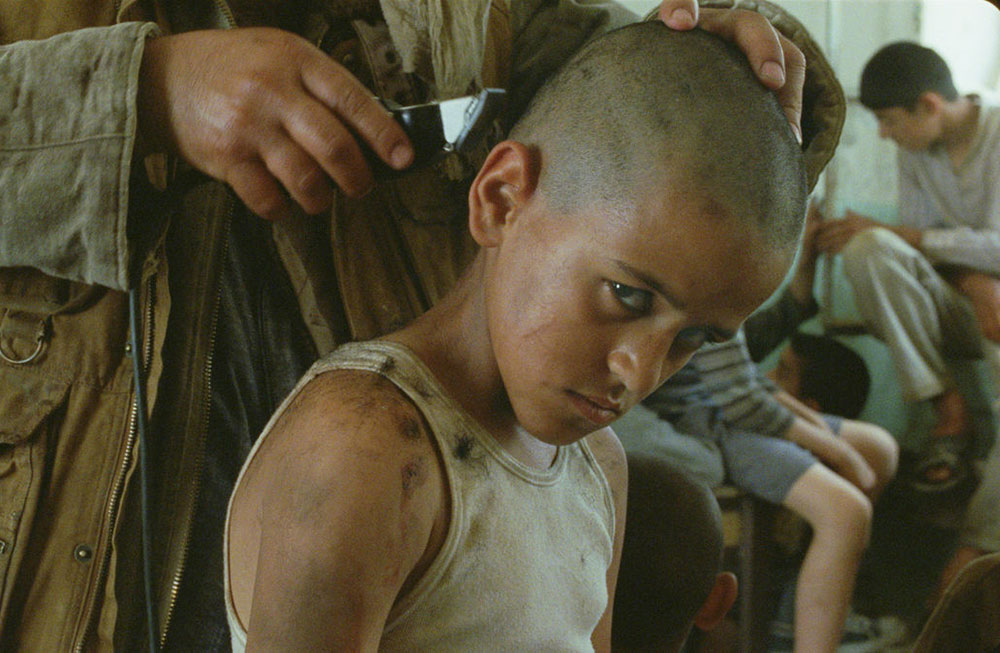From a far distance, the camera captures the beautiful rugged landscape identical to the American Westerns with undulating mountains and palm trees floating by the wind. It stays there for several seconds—silent, calm as the moments before the storm. Then it tracks back slowly through a broken window to a room filled with masked gunmen and children soaked in blood and bruises and having their heads shaved. Slowly Radiohead’s “You and Whose Army?” fades in the background, breaking the silence until now. The atmosphere suddenly shifts to a tense one. Added with this bewilderment, the camera slowly zooms in a grim stare of a child filled with anger and hatred. This environment from the opening sequence filled with terror, anger, and horrors carries forward for the next 2 hours and 10 minutes in the dark tale of “Incendies.”
A Quest that Leads to Old Wounds
Based on the play by the same name by Wajdi Mouawad, Denis Villeneuve’s Canadian drama revolves around the story of a Canadian woman of Middle Eastern descent, Nawal (Lubna Azabal), who left two envelopes for her twin son, Simon (Maxim Gaudette), and daughter, Jeanne (Melissa Desormeaux-Poulin) to deliver to their estranged brother and father respectively as her last wish after death. Though initially hesitant, they accept this task and try to find their father and brother only by retracing their mother’s horrific past life through a violent civil war in the Middle East.
With this context of retracing in the story itself, Villeneuve also tries to retrace the history in today’s world; in doing so, his filmic narrative and techniques obscure the line between the past and the present. In that process, the present walks on the same footprints of the past. It marks “Incendies” a deep study of past human traumas and its present-day rejuvenation across different generations and periods.
Because of its non-linear screenplay structure, “Incendies” goes back and forth to the past life of Nawal and the present-day journey of her children. Villeneuve juxtaposes these two different timeframes without breaking the continuity, merging these two into a larger context. With the meticulous design, editing, and cinematography, he manages to take down the past from just being a distant memory to remember, or giving a certain context to the background. Rather it becomes an acting ghost chasing the characters from different timeframes by living and reliving in it.

Civil War and All its Traumas
The civil war and its trauma definitely shatter Nawal; but how that trauma seeps to the present and transcends through generations is the main objective of Villeneuve’s film. By visiting the same prison their mother is held captive or going to their mother native village, the children relive the same moments with their personal experiences. This evokes the past traumas to the forefront to the present.
Also, putting different characters in almost the same environment, Villeneuve subverts their roles in this journey of retracing. One shot of Nawal’s search for her son amidst civil war match cuts with the present-day search of her daughter’s; it obscures and perplexes us to question whose story is this and which timeframe we are seeing. Alongside using similar kinds of shots from the same angles in both timeframes, Villeneuve creates invisible intertextuality between them.
A deep drama about the people affected by the war—and to what extent their suffering transcends through different periods—“Incendies” never aspires to become a war film (if it can be considered) dramatizing the history to make melodrama; yet it cultivates how its effects seep through time and what relevancy it contains in modern-day.
Lubna Azabal Shines; as Does the Entire Cast
Lubna Azabal in the role of Nawal is equally haunting and heart-breaking. The angst, grief, hope, and hopelessness are rightly put into that one role by her. One scene, where she sings after being tortured is agonizing yet mesmerizing. She lives the character of Nawal with all her all soul; nobody could be better than her to play this challenging character.
The performances of her children (Maxim Gaudette and Melissa Desormeaux-Poulin) also do a good job in their respective roles. They display their initial hesitancy, complex relationship with their mother, and dealings with traumas unfolding in front of them from their mother’s past life perfectly. The vulnerability, frustration, and helplessness adorns their face in utter conviction, and it’s equally heartbreaking to see the final outcome of them.
Amidst all these moments of darkness, when we expect to have some hope and solace, a haunting plot twist shatters us, reminding us of the unwritten rule of the past: that if we poke it, it will retaliate. This horrific finale of this dark human drama shatters from the core, haunting even after the end credits roll.
Villeneuve considers “Incendies” a Greek tragedy set in the modern time. With the precise finesse of capturing the tragedy of human life with the rejuvenation of tormented past into present day’s relevancy, Villeneuve creates a modern masterpiece you can’t simply miss.
Viewers can rent or stream “Incendies” through most streaming platforms.